Uzbekistan hosted a seminar on transboundary water basins – the river basin of the Shakhimardan River and the Isfayram-Sai River in Fergana on June 25 – 26, 2024.
The seminar in Samarkand is moderated by a national project consultant and CAREC Program Manager “Climate Change and Sustainable Energy” Irina Bekmirzaeva.
The workshop on transboundary water basins was organized within the framework of the “Climate Risk Assessment and Capacity Development” (CRDA) project, implemented within the framework of the GIZ program “Climate Risk Management in Central Asia”. The assignments were implemented by NIRAS in collaboration with the Regional Environmental Centre for Central Asia (CAREC).
The project involves a series of transboundary activities at the country level to identify and assess climate risks for each of the selected transboundary water basins, in particular for Isfayram-Say (Kyrgyzstan and Uzbekistan), Shakhimardan (Kyrgyzstan and Uzbekistan), Zarafshan (Tajikistan and Uzbekistan), Chon-Kemin/Chu River (Kyrgyzstan and Kazakhstan) and Murgab (Turkmenistan).
“Based on the climate risks assessed for each water basin, the project will formulate climate change adaptation measures (CCA) for each water basin. The Climate Risk Assessment (CRA) is carried out in accordance with the GIZ Climate Risk Handbook, adapted for work in transboundary river basins. The following stages are implemented: defining the scope of work, collecting data and information, identifying risks, analysis and assessment, and selecting adaptation measures. In addition, the topics “Monitoring and Evaluation”, as well as “Communication” will become part of the final R&D report,” notes Irina Bekmirzaeva, national project consultant, CAREC Program Manager “Climate Change and Sustainable Energy”.
According to her, from April to May 2024, country-level workshops were held in all participating countries, i.e., Kazakhstan, Uzbekistan, Tajikistan, Kyrgyzstan and Turkmenistan.
As Irina Bekmirzaeva notes, the purpose of these workshops was to identify (i) key stakeholders, (ii) key sources of information related to climate risks, and (iii) key hazards, sectors, services and key vulnerable groups that are directly affected by climate change in every watershed. The workshops were organized in close cooperation with GIZ and national colleagues in each country, i.e.
in Kazakhstan: Ministry of Ecology and Natural Resources,
in Kyrgyzstan: State Committee on Ecology and Climate,
in Tajikistan: State Committee for Environmental Protection,
in Turkmenistan: Ministry of Agriculture and Environment,
in Uzbekistan: Ministry of Ecology, Environmental Protection and Climate Change.
According to the national project consultant Irina Bekmirzaeva, the first round of transboundary water basin workshops is now being organized, their main goal is the joint identification, analysis and prioritization of climate risks in each selected water basin.
“The workshop on the two transboundary basins of the Isfayram-Sai and Shakhimardan rivers will promote transboundary cooperation, paying special attention to the identification and analysis of hazards and vulnerabilities aggravated by climate change,” emphasized Irina Bekmirzaeva.
As the manager of the CAREC program “Climate Change and Sustainable Energy” noted, the second round of transboundary seminars on water basins will be organized in July 2024 to develop climate change adaptation measures for selected five priority risks in each water basin. As part of the project, workshops will be organized in such a way that one of two planned workshops will be held on each side of the transboundary water basin.

Following the workshop in Fergana, participants discussed and agreed on common climate risks in the water basin, which will allow them to make informed decisions regarding the selection and implementation of adaptation measures.
“The objectives of today’s transboundary water basin workshop are therefore to take stock of the national workshop participants and to inform new workshop participants about the results of the Kyrgyzstan and Uzbekistan scoping workshop, to improve understanding of differences and similarities in transboundary impacts, and to jointly identify, analysis and prioritization of climate risks in the basin for further work,” said Irina Bekmirzaeva.


